现在完成时讲解和练习有答案
现在完成时专项练习题及答案解析

现在完成时专项练习题及答案解析一、练习题1. 选择正确的现在完成时形式填空。
(1) I _______ (already/just) _______ (finish) my homework.(2) She _______ (already/just) _______ (finish) her dinner.2. 选择正确的现在完成时形式填空。
(1) They _______ (already/just) _______ (arrive) at the airport.(2) He _______ (already/just) _______ (leave) the office.3. 选择正确的现在完成时形式填空。
(1) We _______ (already/just) _______ (eat) our lunch.(2) You _______ (already/just) _______ (finish) your work.4. 选择正确的现在完成时形式填空。
(1) She _______ (already/just) _______ (start) her new job.(2) He _______ (already/just) _______ (finish) his project.5. 选择正确的现在完成时形式填空。
(1) They _______ (already/just) _______ (arrive) at the hotel.(2) I _______ (already/just) _______ (leave) the house.二、答案解析1. (1) already finish (2) just finish解析:在第一题中,"already"用于强调动作已经完成,而"just"用于强调动作刚刚完成。
因此,根据句意,第一个空应填"already",第二个空应填"just"。
人教新目标初中英语语法-现在完成时讲解以及练习题(含答案)
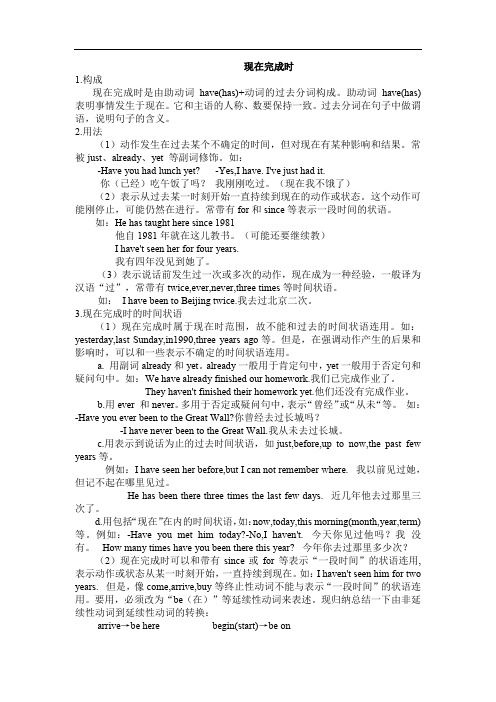
现在完成时1.构成现在完成时是由助动词have(has)+动词的过去分词构成。
助动词have(has)表明事情发生于现在。
它和主语的人称、数要保持一致。
过去分词在句子中做谓语,说明句子的含义。
2.用法(1)动作发生在过去某个不确定的时间,但对现在有某种影响和结果。
常被just、already、yet 等副词修饰。
如:-Have you had lunch yet? -Yes,I have. I've just had it.你(已经)吃午饭了吗?我刚刚吃过。
(现在我不饿了)(2)表示从过去某一时刻开始一直持续到现在的动作或状态。
这个动作可能刚停止,可能仍然在进行。
常带有for和since等表示一段时间的状语。
如:He has taught here since 1981他自1981年就在这儿教书。
(可能还要继续教)I have't seen her for four years.我有四年没见到她了。
(3)表示说话前发生过一次或多次的动作,现在成为一种经验,一般译为汉语“过”,常带有twice,ever,never,three times等时间状语。
如:I have been to Beijing twice.我去过北京二次。
3.现在完成时的时间状语(1)现在完成时属于现在时范围,故不能和过去的时间状语连用。
如:yesterday,last Sunday,in1990,three years ago等。
但是,在强调动作产生的后果和影响时,可以和一些表示不确定的时间状语连用。
a. 用副词already和yet。
already一般用于肯定句中,yet一般用于否定句和疑问句中。
如:We have already finished our homework.我们已完成作业了。
They haven't finished their homework yet.他们还没有完成作业。
b.用ever 和never。
现在完成时与现在完成进行时态讲解及练习(含答案)
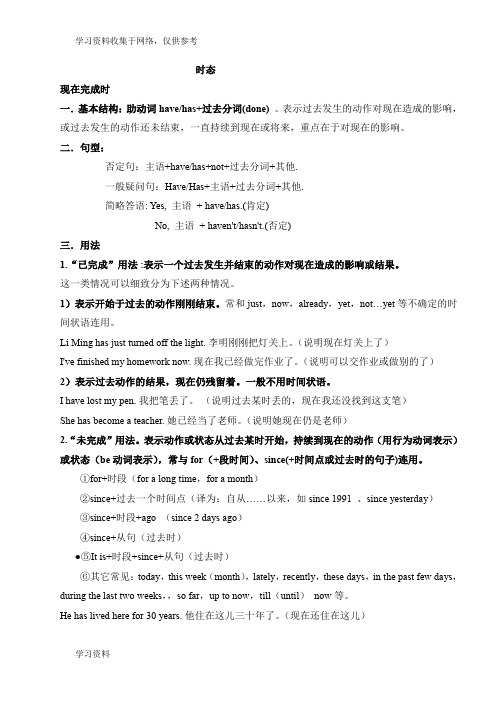
时态现在完成时一.基本结构:助动词have/has+过去分词(done) 。
表示过去发生的动作对现在造成的影响,或过去发生的动作还未结束,一直持续到现在或将来,重点在于对现在的影响。
二.句型:否定句:主语+have/has+not+过去分词+其他.一般疑问句:Have/Has+主语+过去分词+其他.简略答语: Yes, 主语+ have/has.(肯定)No, 主语+ haven't/hasn't.(否定)三.用法1.“已完成”用法 :表示一个过去发生并结束的动作对现在造成的影响或结果。
这一类情况可以细致分为下述两种情况。
1)表示开始于过去的动作刚刚结束。
常和just,now,already,yet,not…yet等不确定的时间状语连用。
Li Ming has just turned off the light. 李明刚刚把灯关上。
(说明现在灯关上了)I've finished my homework now. 现在我已经做完作业了。
(说明可以交作业或做别的了)2)表示过去动作的结果,现在仍残留着。
一般不用时间状语。
I have lost my pen. 我把笔丢了。
(说明过去某时丢的,现在我还没找到这支笔)She has become a teacher. 她已经当了老师。
(说明她现在仍是老师)2.“未完成”用法。
表示动作或状态从过去某时开始,持续到现在的动作(用行为动词表示)或状态(be动词表示),常与for(+段时间)、since(+时间点或过去时的句子)连用。
①for+时段(for a long time,for a month)②since+过去一个时间点(译为:自从……以来,如since 1991 、since yesterday)③since+时段+ago (since 2 days ago)④since+从句(过去时)●⑤It is+时段+since+从句(过去时)⑥其它常见:today,this week(month),lately,recently,these days,in the past few days,during the last two weeks,,so far,up to now,till(until)now等。
初中现在完成时讲解练习及答案_4

现在完成时精讲和专练I.定义:表示过去发生或已经完成的动作对现在造成的影响或结果,也可以表示过去已经开始,一直延续到现在的动作或状态II.现在完成时的结构肯定句:have/has+ done (过去分词)否定句:主语+have/has+not+ done (过去分词)+其他.一般疑问句:Have/Has+主语+ done (过去分词)+其他.简略答语: Yes, 主语+ have/has.(肯定)No, 主语+ haven't/hasn't.(否定)注意:表示短暂时间动作的词,如:come,go,die,marry,buy等的完成时不能与for,since等表示一段时间的词连用。
用来持续的动作或状态或表过去重复的动作,如live,study,be,wait等,常和since(自从)或for(经历)引导的词语连用。
如:I have lived here for more than thirty years.我已在此住了30多年。
III.现在完成时的标志1.现在完成时的含义之一是过去完成的动作对现在仍有影响, 现在完成时通常和,ever, never, twice(once…), so far(到目前为止), since,for,in the past/last few years(在过去几年), already(肯定句), yet(否定,疑问句), just(刚刚), before(以前), recently (近来)等词连用说明:already与yet都有“已经”的意思,但already常用于肯定句,并用于句中。
yet 常用于否定句和疑问句,并用于句末。
例如:I have already finished my homework.I haven’t finished my homework yet. Have you finished your homework yet?They have left. (他们已经离开了,也就是说现在他们人不在这里)I have had my lunch. (我已经吃过午饭了,也就是说我现在不饿)I can’t find my watch now. I think I have already lost it.2.过去已经开始的动作一直延续到现在, 甚至有可能继续延续下去,我们可以从动作“延续”的特性和“时间”点段的区分入手。
牛津译林版英语八下_Units 1-3 现在完成时语法讲解和练习
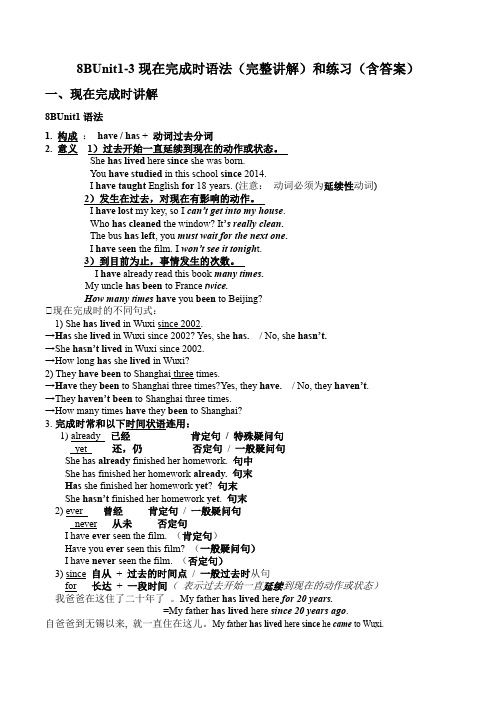
8BUnit1-3现在完成时语法(完整讲解)和练习(含答案)一、现在完成时讲解8BUnit1语法1. 构成:have / has + 动词过去分词2. 意义1)过去开始一直延续到现在的动作或状态。
She has lived here since she was born.You have studied in this school since 2014.I have taught English for 18 years. (注意:动词必须为延续性动词)2)发生在过去,对现在有影响的动作。
I have lost my key, so I can’t get into my house.Who has cleaned the window? It’s really clean.The bus has left, you must wait for the next one.I have seen the film. I won’t see it tonigh t.3)到目前为止,事情发生的次数。
I have already read this book many times.My uncle has been to France twice.How many times have you been to Beijing?★现在完成时的不同句式:1) She has lived in Wuxi since 2002.→Has she lived in Wuxi since 2002? Yes, she has./ No, she hasn’t.→She hasn’t lived in Wuxi since 2002.→How long has she lived in Wuxi?2) They have been to Shanghai three times.→Have they been to Shanghai three times?Yes, they have./ No, they haven’t.→They haven’t been to Shanghai three times.→How many times have they been to Shanghai?3.完成时常和以下时间状语连用:1)already 已经肯定句/ 特殊疑问句yet 还,仍否定句/ 一般疑问句She has already finished her homework. 句中She has finished her homework already.句末Has she finished her homework yet? 句末She hasn’t finished her homework yet. 句末2) ever 曾经肯定句/ 一般疑问句never 从未否定句I have ever seen the film. (肯定句)Have you ever seen this film? (一般疑问句)I have never seen the film. (否定句)3) since 自从+ 过去的时间点/ 一般过去时从句for 长达+ 一段时间(表示过去开始一直延续到现在的动作或状态)我爸爸在这住了二十年了。
英语现在完成时专题练习(及答案)及解析
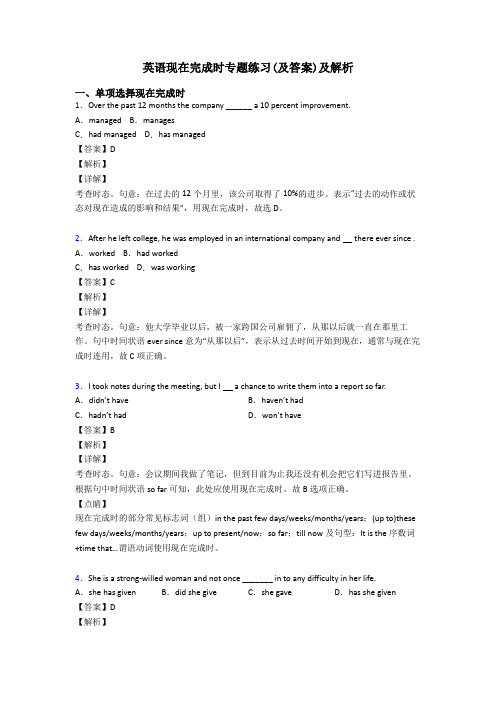
5.—What a stupid mistake!
—Yes. I ______ you doing it carefully, but without success.
A.was suggestingB.will suggest
C.have suggestedD.had suggested
【解析】
【详解】
考查时态。句意:在过去的12个月里,该公司取得了10%的进步。表示“过去的动作或状态对现在造成的影响和结果”,用现在完成时,故选D。
2.After he left college, he was employed in an international company andthere ever since .
A.worked B.had worked
C.has worked D.was working
【答案】C
【解析】
【详解】
考查时态。句意:他大学毕业以后,被一家跨国公司雇佣了,从那以后就一直在那里工作。句中时间状语ever since意为“从那以后”,表示从过去时间开始到现在,通常与现在完成时连用,故C项正确。
考点:考查非谓语动词
7.Tony is one of the five students in his class who ______ the exam. How lucky he is!
A.is passingB.passes
C.has passedD.have passed
【答案】D
【解析】
考察时态语态。托尼是班上5个通过考试的学生之一,他真幸运。由题意可知,通过考试这件事在人谈论这件事之前发生,所以,采用完成时态。通过考试是主动形式,并且定语从句中的who修饰的是five students,所以是have passed,故选D
(完整版)现在完成时讲解(含讲解及习题)(可编辑修改word版)
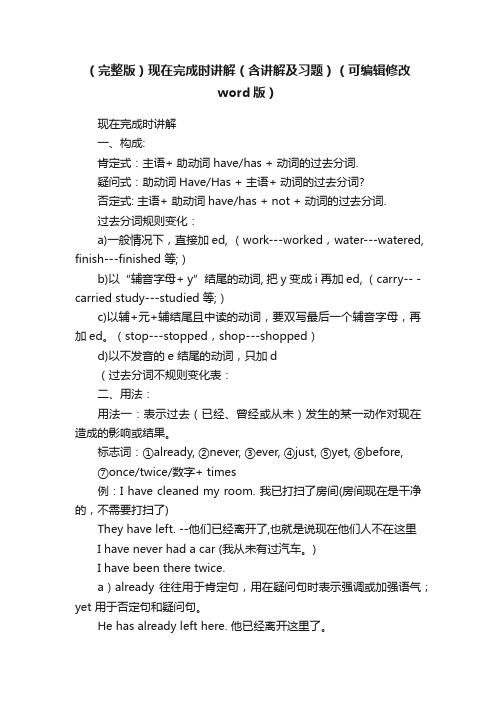
(完整版)现在完成时讲解(含讲解及习题)(可编辑修改word版)现在完成时讲解一、构成:肯定式:主语+ 助动词have/has + 动词的过去分词.疑问式:助动词Have/Has + 主语+ 动词的过去分词?否定式: 主语+ 助动词have/has + not + 动词的过去分词.过去分词规则变化:a)一般情况下,直接加ed, (work---worked,water---watered, finish---finished 等;)b)以“辅音字母+ y”结尾的动词, 把y 变成i 再加ed, (carry-- -carried study---studied 等;)c)以辅+元+辅结尾且中读的动词,要双写最后一个辅音字母,再加ed。
(stop---stopped,shop---shopped)d)以不发音的e 结尾的动词,只加d(过去分词不规则变化表:二、用法:用法一:表示过去(已经、曾经或从未)发生的某一动作对现在造成的影响或结果。
标志词:①already, ②never, ③ever, ④just, ⑤yet, ⑥before,⑦once/twice/数字+ times例:I have cleaned my room. 我已打扫了房间(房间现在是干净的,不需要打扫了)They have left. --他们已经离开了,也就是说现在他们人不在这里I have never had a car (我从未有过汽车。
)I have been there twice.a)already 往往用于肯定句,用在疑问句时表示强调或加强语气;yet 用于否定句和疑问句。
He has already left here. 他已经离开这里了。
Has he already left here? 他(真的)已经离开这里了吗?(表示加强语气)My teachers haven’t had breakfast yet. 我的老师们还没有吃早饭。
现在完成时练习题带答案

现在完成时练习题带答案1. 我已经完成了我的作业。
- 英文:I have finished my homework.- 答案:have finished2. 他还没有去过中国。
- 英文:He hasn't been to China.- 答案:hasn't been3. 她已经学会了三门语言。
- 英文:She has learned three languages.- 答案:has learned4. 他们自2010年以来一直住在这个城市。
- 英文:They have lived in this city since 2010. - 答案:have lived5. 你看过这部电影吗?- 英文:Have you seen this movie?- 答案:seen6. 我还没有收到他的回信。
- 英文:I haven't received his reply yet.- 答案:haven't received7. 他们已经完成了项目。
- 英文:They have completed the project.- 答案:have completed8. 她已经去过巴黎两次了。
- 英文:She has been to Paris twice.- 答案:has been9. 我们还没有决定去哪里度假。
- 英文:We haven't decided where to go for vacation.- 答案:haven't decided10. 他自从大学毕业后就没有再见过他的朋友。
- 英文:He hasn't seen his friends since he graduatedfrom university.- 答案:hasn't seen练习题答案解析- 现在完成时的构成是:主语 + have/has + 过去分词。
- 使用现在完成时时,要注意动词的过去分词形式。
现在完成时练习题含答案及解析
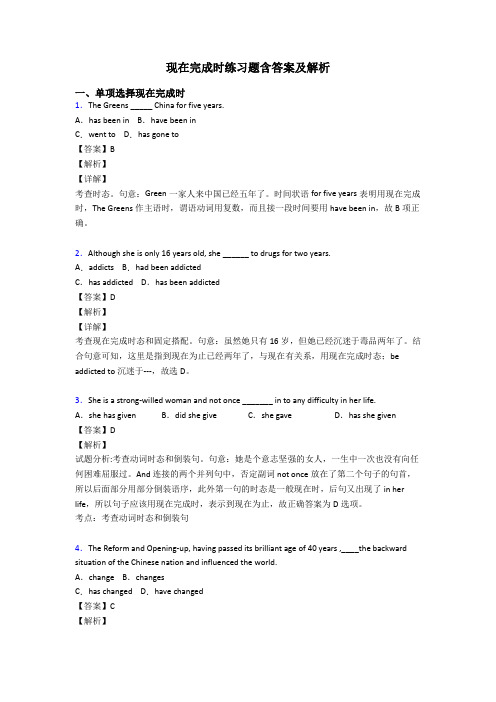
现在完成时练习题含答案及解析一、单项选择现在完成时1.The Greens _____ China for five years.A.has been in B.have been inC.went to D.has gone to【答案】B【解析】【详解】考查时态。
句意:Green一家人来中国已经五年了。
时间状语for five years表明用现在完成时,The Greens作主语时,谓语动词用复数,而且接一段时间要用have been in,故B项正确。
2.Although she is only 16 years old, she ______ to drugs for two years.A.addicts B.had been addictedC.has addicted D.has been addicted【答案】D【解析】【详解】考查现在完成时态和固定搭配。
句意:虽然她只有16岁,但她已经沉迷于毒品两年了。
结合句意可知,这里是指到现在为止已经两年了,与现在有关系,用现在完成时态;be addicted to沉迷于---,故选D。
3.She is a strong-willed woman and not once _______ in to any difficulty in her life.A.she has given B.did she give C.she gave D.has she given【答案】D【解析】试题分析:考查动词时态和倒装句。
句意:她是个意志坚强的女人,一生中一次也没有向任何困难屈服过。
And 连接的两个并列句中,否定副词 not once放在了第二个句子的句首,所以后面部分用部分倒装语序,此外第一句的时态是一般现在时,后句又出现了in her life,所以句子应该用现在完成时,表示到现在为止,故正确答案为D选项。
考点:考查动词时态和倒装句4.The Reform and Opening-up, having passed its brilliant age of 40 years ,____the backward situation of the Chinese nation and influenced the world.A.change B.changesC.has changed D.have changed【答案】C【解析】考查时态。
(完整版)小学现在完成时详细讲解与练习

(完整版)小学现在完成时详细讲解与练习什么是现在完成时?现在完成时是英语中的一种时态,用来描述过去发生的动作或事件对现在造成的影响或结果。
在现在完成时中,动词需要用到助动词“have/has”加上过去分词形式。
如何构成现在完成时的肯定句?现在完成时的肯定句构成为:“主语 + have/has + 过去分词 + 其他补充信息”。
例如:- I have finished my homework.(我已经完成了我的作业。
)- He has seen that movie.(他已经看过那部电影。
)如何构成现在完成时的否定句?现在完成时的否定句构成为:“主语 + have/has + not + 过去分词 + 其他补充信息”。
例如:- I have not finished my homework.(我还没有完成我的作业。
)- She has not seen that movie.(她还没有看过那部电影。
)如何构成现在完成时的疑问句?现在完成时的疑问句构成为:“Have/Has + 主语 + 过去分词 +其他补充信息?”例如:- Have you finished your homework?(你完成作业了吗?)- Has she seen that movie?(她看过那部电影吗?)现在完成时的用法现在完成时通常用来表示以下几种情况:1. 过去发生的动作对现在造成的影响或结果。
2. 过去开始的动作直到现在还在持续进行。
3. 刚刚完成的动作或经历。
例如:- I have lost my wallet.(我丢了钱包。
)- They have lived in this city for ten years.(他们在这个城市已经住了十年。
)- She has just arrived at the airport.(她刚刚到达机场。
)现在完成时的练1. 请用现在完成时造句:(例句仅供参考)- 我已经吃过晚饭了。
现在完成时讲解及练习(答案)

现在完成时讲解及练习(答案)初中英语主要时态系列(六)——现在完成时讲解及练习1现在完成时的基本结构肯定句:主语+have/has+动词的过去分词+其他否定句:主语+have/has+not+动词的过去分词+其他⼀般疑问句:Have/Has+主语+动词的过去分词+其他特殊疑问句:特殊疑问词+⼀般疑问句(have/has+主语+过去分词+其他)2现在完成时的⽤法1. 现在完成时⽤来表⽰过去已经完成的动作对现在造成影响或后果。
也就是说,动作或状态发⽣在过去但它的影响现在还存在,强调的是现在。
I have already posted the photo.我已经邮寄出了照⽚。
与此种⽤法连⽤的时间状语时⼀些模糊的过去时间状语,如already(肯定句句中), yet(否定句/疑问句句尾), just, before, recently,still, lately,never 等。
2. 现在完成时也可⽤来表⽰动作或状态发⽣在过去某⼀时刻,持续到现在并且有可能会继续持续下去。
He has lived here since 1978.⾃从1978年以来,他⼀直住在这⼉。
(动作起始于1978年,⼀直住到现在,可能还要继续住下去。
)此种⽤法常与for(+时间段),since(+时间点或过去时的句⼦)连⽤。
谓语动词必须是延续性动词。
有些瞬间动词可变为延续动词:go out----be out finish----be over open----be open die----be dead buy---have fall ill---be ill come back----be back catch a cold----have a cold3现在完成时常见考法对于现在完成时的考查,多以单选、句型转换或词语运⽤的形式考查学⽣在具体语境中灵活运⽤时态的能⼒。
在考试中,会让⼤家判断是否该⽤现在完成时,或者是考查“瞬间动词”不能与表⽰⼀段时间的状语连⽤”这⼀知识点。
(完整版)高一现在完成时讲解及练习(含答案)
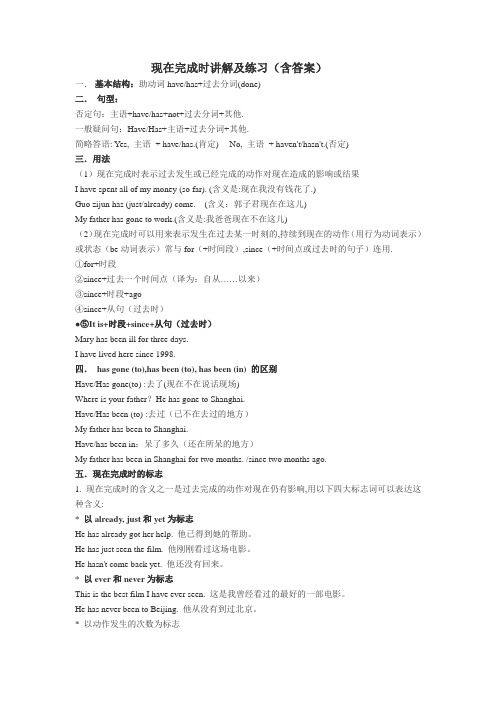
现在完成时讲解及练习(含答案)一.基本结构:助动词have/has+过去分词(done)二.句型:否定句:主语+have/has+not+过去分词+其他.一般疑问句:Have/Has+主语+过去分词+其他.简略答语: Yes, 主语+ have/has.(肯定) No, 主语+ haven't/hasn't.(否定)三.用法(1)现在完成时表示过去发生或已经完成的动作对现在造成的影响或结果I have spent all of my money (so far). (含义是:现在我没有钱花了.)Guo zijun has (just/already) come. (含义:郭子君现在在这儿)My father has gone to work.(含义是:我爸爸现在不在这儿)(2)现在完成时可以用来表示发生在过去某一时刻的,持续到现在的动作(用行为动词表示)或状态(be动词表示)常与for(+时间段),since(+时间点或过去时的句子)连用.①for+时段②since+过去一个时间点(译为:自从……以来)③since+时段+ago④since+从句(过去时)●⑤It is+时段+since+从句(过去时)Mary has been ill for three days.I have lived here since 1998.四.has gone (to),has been (to), has been (in) 的区别Have/Has gone(to) :去了(现在不在说话现场)Where is your father?He has gone to Shanghai.Have/Has been (to) :去过(已不在去过的地方)My father has been to Shanghai.Have/has been in:呆了多久(还在所呆的地方)My father has been in Shanghai for two months. /since two months ago.五.现在完成时的标志1. 现在完成时的含义之一是过去完成的动作对现在仍有影响,用以下四大标志词可以表达这种含义:* 以already, just和yet为标志He has already got her help. 他已得到她的帮助。
现在完成时讲解_50道现在完成时练习题(含答案)
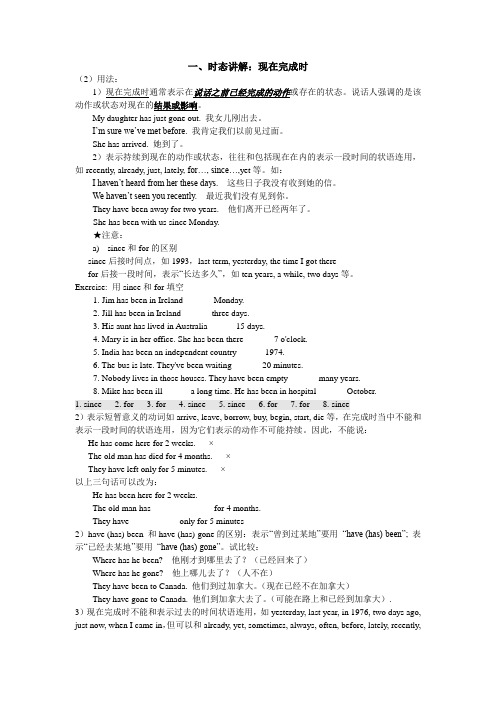
一、时态讲解:现在完成时(2)用法:1)现在完成时通常表示在说话之前已经完成的动作或存在的状态。
说话人强调的是该动作或状态对现在的结果或影响。
My daughter has just gone out. 我女儿刚出去。
I’m sure we’ve met before. 我肯定我们以前见过面。
She has arrived. 她到了。
2)表示持续到现在的动作或状态,往往和包括现在在内的表示一段时间的状语连用,如recently, already, just, lately, for…, since…,yet等。
如:I haven’t heard from her these days. 这些日子我没有收到她的信。
We haven’t seen you recently. 最近我们没有见到你。
They have been away for two years. 他们离开已经两年了。
She has been with us since Monday.★注意:a)since和for的区别since后接时间点,如1993,last term, yesterday, the time I got therefor后接一段时间,表示“长达多久”,如ten years, a while, two days等。
Exercise: 用since和for填空1. Jim has been in Ireland ______ Monday.2. Jill has been in Ireland ______ three days.3. His aunt has lived in Australia ______15 days.4. Mary is in her office. She has been there ______ 7 o'clock.5. India has been an independent country ______1974.6. The bus is late. They've been waiting ______ 20 minutes.7. Nobody lives in those houses. They have been empty ______ many years.8. Mike has been ill ______a long time. He has been in hospital ______ October.1. since2. for3. for4. since5. since6. for7. for8. since2)表示短暂意义的动词如arrive, leave, borrow, buy, begin, start, die等,在完成时当中不能和表示一段时间的状语连用,因为它们表示的动作不可能持续。
现在完成时讲解和练习(有答案)

现在完成时讲解和练习1. 现在完成时的构成: have\has+过去分词(过去分词的构成有规则变化和不规则变化)2. 现在完成时的四个基本句型肯定句He has finished the work.一般疑问句Has he finished the work? 回答Yes ,he has. No, he hasn’t.否定句He has not finished the work.特殊疑问句What has he done?3.现在完成时的用法:A.表示过去发生或已经完成的动作对现在造成的影响或结果,强调对现在造成的影想或结果)。
例如:The car has arrived. 车子来了。
(结果:车子已在门口)Someone has broken the window.有人把窗户打破了。
(结果:窗户仍破着)B. 表示过去已经开始,持续到现在的动作或状态,可以和表示从过去某一时刻延续到现在(包括“现在”在内)的一段时间的状语连用,如for+时间段、since+过去的时间点、疑问词how long等。
例如: My uncle has worked at this factory for five years. 我叔叔在这个工厂工作已经五年了。
Mr. Black has lived in China since 2002. 自从2002年Mr. Black 一直住在中国。
How long have you been here? 你来这里多久了?4. 在下列情形下用现在完成时(1)九词语①already已经肯定句中或句尾e.g.: I have already found my pen.= I have found my pen already.②yet已经否定句和疑问句句尾e.g.:I have not finished the work yet.Have you bought a computer yet?③ever曾经句中e.g.:Have you ever seen pandas?④never从不句中e.g.:I have never been to Beijing. ⑤just刚刚句中e.g.:I have just done my work.⑥before以前句尾e.g.:I have never been there before.⑦so far到目前为止e.g.:So far he has learnt 200 words.⑧how long多久e.g.:How long have you lived here?⑨how many times多少次e.g.:How many times has he been to Beijing?(3)三词组1.have<has>gone to去了某地表示“已经去了某地,在去那里的途中或到达那里还没有回来”e.g.:He has gone to Beijing (去了北京)2.have<has>been to去过某地表示“曾去过某地,已经从那里回来了”e.g.:He has been to Beijing. (去过北京)3.have<has>been in 表示“在某地呆多长时间”,常与表示一段时间的状语连用,如:since, for, how longe.g.: Mr. Brown has been in Beijing for three days. 布朗先生来北京已经有三天了4.如果句子里面没有时间状语,汉语意思能够加“已经”,往往用现在完成时态。
现在完成时讲解及练习(附答案)-名师精讲(新)

现在完成时先看几个例句:1. I have cleaned my room. 我已打扫了房间。
2. He hasn’t finished his homework. 他还没完成作业。
3. Have you read this novel ? 你看过这本小说吗?Yes , I have. 是的,看过了。
No, I haven’t. 不,没看过。
4. We have studied English for two years.我们已经学了两年英语了。
5. They haven’t seen each other since 1998.自从1998年他们就没再见过面。
一、构成:肯定式:主语+ 助动词have/has + 动词的过去分词.疑问式:助动词Have/Has + 主语+ 动词的过去分词?否定式: 主语+ 助动词have/has + not + 动词的过去分词.例:I have worked here for 3 years.否定句:疑问句:回答:就划线部分提问:过去分词的构成分为规则变化和不规则变化两种:规则变化:a) 一般情况下,在动词后直接加ed, 如play---played, work---worked,water---watered, finish---finished等;b) 以“辅音字母+ y”结尾的动词, 把y 变成i 再加ed, carry-- -carried study---studied等;c) 以一个辅音字母结尾的重读闭音节的动词要双写最后一个辅音字母,再加ed 如: stop---stopped,shop---shopped等。
不规则变化:见一般时当中的不规则动词表点击→不规则动词表写出下列动词的过去分词:put--- hear--- come---make--- hurry--- watch---swim--- be--- talk---want--- study--- stop---take--- see--- like---二、用法:1.表示过去发生的某一动作对现在造成的影响或结果。
高中英语 现在完成进行时与现在完成时讲解及专项练习(有答案)
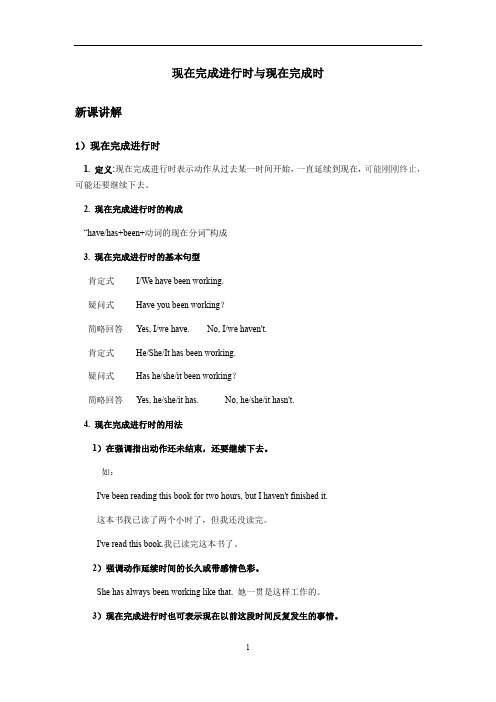
现在完成进行时与现在完成时新课讲解1)现在完成进行时1. 定义:现在完成进行时表示动作从过去某一时间开始,一直延续到现在,可能刚刚终止,可能还要继续下去。
2. 现在完成进行时的构成“have/has+been+动词的现在分词”构成3. 现在完成进行时的基本句型肯定式I/We have been working.疑问式Have you been working?简略回答Yes, I/we have. No, I/we haven't.肯定式He/She/It has been working.疑问式Has he/she/it been working?简略回答Yes, he/she/it has. No, he/she/it hasn't.4. 现在完成进行时的用法1)在强调指出动作还未结束,还要继续下去。
如:I've been reading this book for two hours, but I haven't finished it.这本书我已读了两个小时了,但我还没读完。
I've read this book.我已读完这本书了。
2)强调动作延续时间的长久或带感情色彩。
She has always been working like that. 她一贯是这样工作的。
3)现在完成进行时也可表示现在以前这段时间反复发生的事情。
We've been seeing quite a lot of each other recently. 最近我们经常见面。
4)现在完成进行时常与all day, all afternoon, for+一段时间(for seven hours, for four years)等连用如:I have been reading all afternoon. 我整个下午一直在读书。
【注意】1.有些表示状态,感情,感觉的动词如:have, exist, like., hate, hear, know, sound等动词不能用于现在完成进行时2.现在完成进行时没有否定式2)现在完成时1、含义:A.表示过去发生并且已经完成的动作对现在造成影响;He has finished his homework. (now he is free)B.表示从过去某一时间开始并一直持续到现在并且有可能还会持续的动作或状态. He has been a teacher for 3 years.2、结构:肯定句:主语+助动词have/has+ 过去分词(done)否定句:主语+助动词have/has not+ 过去分词(done)一般疑问句:Have/Has +主语+过去分词(done)(回答:Yes, 主语+have/has; No, 主语+haven't/hasn't)特殊疑问句:特殊疑问词+have/has+主语+done3、时间标志词:already, yet, so far, as yet, lately ,recently,these days/weeks/years, until now, up to now, since+ 时间点, for+时间段,always, in the last/past( few years)4、用法:A.已经完成的动作,强调对现在的影响。
现在完成时练习题含答案及解析
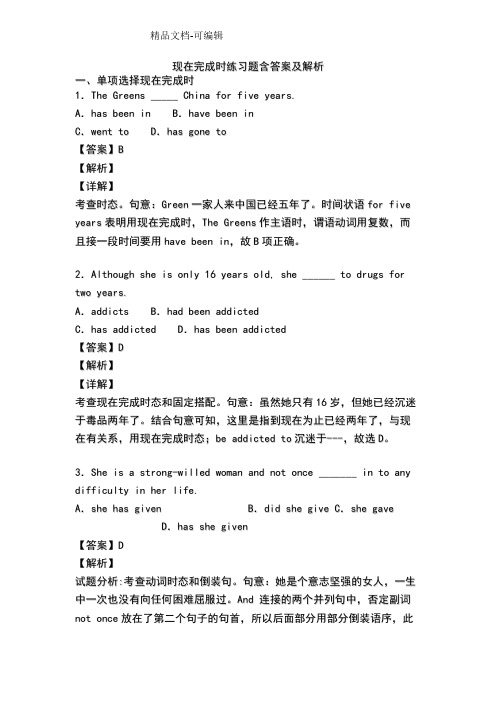
现在完成时练习题含答案及解析一、单项选择现在完成时1.T h e G r e e n s_____C h i n a f o r f i v e y e a r s.A.h a s b e e n i n B.h a v e b e e n i nC.w e n t t o D.h a s g o n e t o【答案】B【解析】【详解】考查时态。
句意:G r e e n一家人来中国已经五年了。
时间状语f o r f i v e y e a r s表明用现在完成时,T h e G r e e n s作主语时,谓语动词用复数,而且接一段时间要用h a v e b e e n i n,故B项正确。
2.A l t h o u g h s h e i s o n l y16y e a r s o l d,s h e______t o d r u g s f o rt w o y e a r s.A.a d d i c t s B.h a d b e e n a d d i c t e dC.h a s a d d i c t e d D.h a s b e e n a d d i c t e d【答案】D【解析】【详解】考查现在完成时态和固定搭配。
句意:虽然她只有16岁,但她已经沉迷于毒品两年了。
结合句意可知,这里是指到现在为止已经两年了,与现在有关系,用现在完成时态;b e a d d i c t e d t o沉迷于---,故选D。
3.S h e i s a s t r o n g-w i l l e d w o m a n a n d n o t o n c e_______i n t o a n y d i f f i c u l t y i n h e r l i f e.A.s h e h a s g i v e n B.d i d s h e g i v e C.s h e g a v eD.h a s s h e g i v e n【答案】D【解析】试题分析:考查动词时态和倒装句。
初中英语语法之现在完成时讲解练习及答案
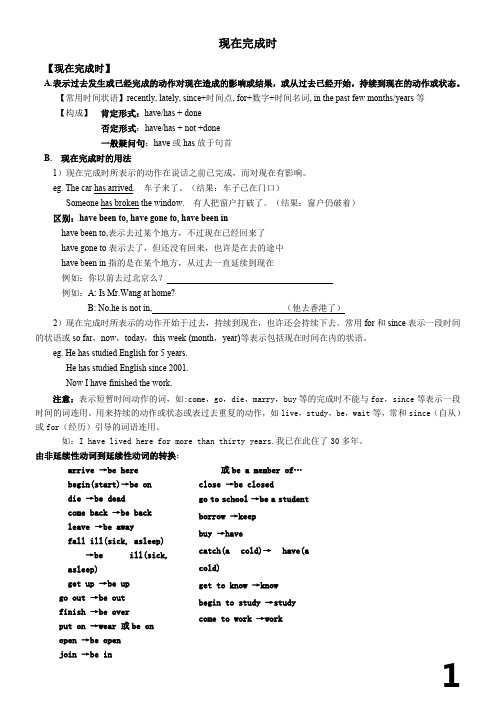
现在完成时【现在完成时】A.表示过去发生或已经完成的动作对现在造成的影响或结果,或从过去已经开始,持续到现在的动作或状态。
【常用时间状语】recently, lately, since+时间点, for+数字+时间名词, in the past few months/years等【构成】肯定形式:have/has + done否定形式:have/has + not +done一般疑问句:have或has放于句首B.现在完成时的用法1)现在完成时所表示的动作在说话之前已完成,而对现在有影响。
eg. The car has arrived.车子来了。
(结果:车子已在门口)Someone has broken the window.有人把窗户打破了。
(结果:窗户仍破着)区别:have been to, have gone to, have been inhave been to,表示去过某个地方,不过现在已经回来了have gone to表示去了,但还没有回来,也许是在去的途中have been in指的是在某个地方,从过去一直延续到现在例如:你以前去过北京么?例如:A: Is Mr.Wang at home?B: No,he is not in,(他去香港了)2)现在完成时所表示的动作开始于过去,持续到现在,也许还会持续下去。
常用for和since表示一段时间的状语或so far,now,today,this week (month,year)等表示包括现在时间在内的状语。
eg. He has studied English for 5 years.He has studied English since 2001.Now I have finished the work.注意:表示短暂时间动作的词,如:come,go,die,marry,buy等的完成时不能与for,since等表示一段时间的词连用。
现在完成时态讲解练习及答案

现在完成时态1.含义:表示过去发生的动作对现在造成的影响和结果。
2.标志词:recently,lately, since短语, for+时间段, up to now, so far,in the past/last few years, ever, never, yet, already, still3.构成: (1)肯定句:主语+ have / has+动词过去分词+其它.(2)否定句:主语+ have / has+not+动词过去分词+其它.(3)一般疑问句:Have / Has+ 主语+动词过去分词+其它?(4)特殊疑问句:特殊疑问词+have/has+主语+动词过去分词+其它?4. 例句:He has lived in Shenzhen for4years.5. 动词过去分词的变化规则:(1)规则变化:直接+ed; 直接+d; 把y变为i+ed; 双写+ed(2)不规则变化:寻找规律,加强记忆. 如AAA; AAB ; ABA ; ABB 等cut-cut-cut; beat-beat-beaten; come-came-come; lose-lost-lost 6. have/has been to; have/has gone to; have/has been in(1)have/ has been to去过… (人已经回来了)我去过上海两次。
I have been to Shanghai twice.(2)have/ has gone to去… (人还没回来)—吉姆在哪?—他去英国了。
—Where is Jim?—He has gone to England.(3)have/ has been in在… (去了某地并一直待在那里)我在上海已经有三年了。
I have been in Shanghai for three years.*7. 延续性动词与非延续性动词(1)含义:英语动词根据动作的持续与否可分为两种,一种是延续性动词,另一种是非延续性动词。
- 1、下载文档前请自行甄别文档内容的完整性,平台不提供额外的编辑、内容补充、找答案等附加服务。
- 2、"仅部分预览"的文档,不可在线预览部分如存在完整性等问题,可反馈申请退款(可完整预览的文档不适用该条件!)。
- 3、如文档侵犯您的权益,请联系客服反馈,我们会尽快为您处理(人工客服工作时间:9:00-18:30)。
现在完成时讲解和练习有答案TTA standardization office【TTA 5AB- TTAK 08- TTA 2C】现在完成时讲解和练习1. 现在完成时的构成: have\has+过去分词 (过去分词的构成有规则变化和不规则变化)2. 现在完成时的四个基本句型肯定句 He has finished the work.一般疑问句 Has he finished the work? 回答 Yes ,he has. No, he hasn’t.否定句 He has not finished the work.特殊疑问句 What has he done3.现在完成时的用法:A.表示过去发生或已经完成的动作对现在造成的影响或结果,强调对现在造成的影想或结果)。
例如:Thecarhasarrived.车子来了。
(结果:车子已在门口)Someonehasbrokenthewindow.有人把窗户打破了。
(结果:窗户仍破着)B.表示过去已经开始,持续到现在的动作或状态,可以和表示从过去某一时刻延续到现在(包括“现在”在内)的一段时间的状语连用,如for+时间段、since+过去的时间点、疑问词how?long等。
例如:Myunclehasworkedatthisfactoryforfiveyears.我叔叔在这个工厂工作已经五年了。
Mr.BlackhaslivedinChinasince2002.自从2002年Mr.Black一直住在中国。
Howlonghaveyoubeenhere你来这里多久了4. 在下列情形下用现在完成时(1)九词语①already已经肯定句中或句尾.: I have already found my pen.= I have found my pen already.②yet已经否定句和疑问句句尾 .:I have not finished the work yet. Have you bought a computer yet?③ever曾经句中.: Have you ever seen pandas?④never从不句中.:I have never been to Beijing. ⑤just刚刚句中.:I have just done my work.⑥before以前句尾.:I have never been there before.⑦so far到目前为止.:So far he has learnt 200 words.⑧how long多久.:How long have you lived here?⑨how many times多少次.:How many times has he been to Beijing?<has>gone to去了某地表示“已经去了某地,在去那里的途中或到达那里还没有回来”.:He has gone to Beijing (去了北京)<has>been to去过某地表示“曾去过某地,已经从那里回来了”.:He has been to Beijing. (去过北京)<has>beenin表示“在某地呆多长时间”,常与表示一段时间的状语连用,如:since,for,howlong.: Mr.BrownhasbeeninBeijingforthreedays.布朗先生来北京已经有三天了4.如果句子里面没有时间状语,汉语意思能够加“已经”,往往用现在完成时态。
.:Have you lost your library book 你已经弄丢了从图书馆借的那本书吗5.现在完成时态还常常用于下列句型They have planted many trees in the last few years. 在过去的几年,他们已经种了很多树。
This is the best book I have ever read. 这是我曾经读过的最好的一本书。
It is the first time I have played the computer games. 这是我第一次玩电脑游戏。
6.在现在完成时中,瞬间动词不能和一段时间状语连用.:He has bought the book for 3 years.(错)因buy这个一次性动词不能和一段时间for 3 years连用, 改正的办法有五种:① He has bought the book.. (去掉一段时间for 3 years)② He bought the book 3 years ago (改为一般过去时,使句子的意思不变)③It’s 3 y ears since he bought the book. = 3 years has passed since he bought the book.(改为固定句型 It is ---since---)④ He has not bought the book for 3 years.(改为否定句)⑤ He has had the book for 3 years. (用延续性动词have代替buy)7. 还有其他瞬间动词也是这种情况,可参照前面的五种办法改正,前四种改法都一样,第五种改法各不相同,举例如下:①come/arrive/get to/reach → be here:I have come here for 3 years.(错)改为:I have been here for 3 years.②leave/go →be away.:He has left for 3 hours.(错)改为:He has been away for 3 hours.③begin/start →be on.:The film has begun for 3 minutes.(错)改为:The film has been on for 3 minutes.④open →be open / close → be closed.:The shop has opened for 3 years.(错) 改为:The shop has been open for 3 years.⑤die →be dead.:His father has died for 3 years.(错) 改为:His father has been dead for 3 years.⑥finish/end→ be over例:He has finished the work for 3 days.(错) 改为:The work has been over for 3 days ⑦join例:I have joined the army for 3 years.(错)改为:I have been in the army for 3 years. 或I have been a soldier for 3 years.⑧buy /catch → have.:I have bought the bike for 3 years.(错)改为:I have had the bike for 3 years.He has caught a cold for 3 days.(错)改为:He has had a cold for 3 days.⑨borrow → keep:I have borrowed the book for 3 years. (错)改为:I have kept the book for 3 years. 还有其它的归纳如下:leave---beawayborrow---keepbuy---havedie---bedeadbegin/start---beonfinish---beoverfallill---beillgetup---beupcatchacold---haveacoldputon--wear come/become/go---beherefallasleep---beasleepgetto/arrive/reach---be(in)gettoknow---know join----beamemberof...(成为…的一员)open---beopenclose---beclose break → be broken \ get up → be up marry → be married \ become → be \ lose → be lost \8.现在完成时态与一般过去时态的区别1一般过去时表示过去某时发生的动作或单纯叙述过去的事情,强调动作;现在完成时为过去发生的,强调过去的事情对现在的影响,强调的是影响。
Isawthisfilmyesterday.(强调动作发生的时间是yesterday。
)Ihaveseenthisfilm.(强调对现在的影响,电影的内容已经知道了。
)2一般过去时和表示过去的时间状语连用,如:…ago,lastweek/...In2008,inthepast,justnow,thedaybeforeyesterday,yesterday...Then(那时),thatday,oneday,once(从前)一、写出以下常用瞬间动词的相应:1. have arrived at/in sw. got to/reached sw. come/gone/moved to sw.→have been in sw./at…2. have come/gone back/returned →____________3. have come/gone out →___________4. have become→________________________/ opened→_____________________ 6. have got up→________________________ ;7. have died →________________________;8. have left sw.→________________________9. have fallen asleep/got to sleep→___________ ;10. have finished/ended/completed→___________;11. have married→____________________;二、用正确的时间表达词汇填空Have you done your homework _______________(for, just, yet)I have _____________ been to Guangdong. (for, never, yet)rHe has worked there _____________ he left school. (already, yet. Since, for) She has known Sam ______________ 9 years. (already, yet. Since, for) Have you ____________ ridden a horse (ever, for, yet)三、用for或since填空family has owned a ship ___________ family has owned a ship ___________ many years.have had a cold _________ last Monday. have had a cold __________ 5 days ago.have had a cold _________ 5 days.四、用所给动词的适当形式填空1. --- I _____________ (see) the film “Chicken Run”.--- Where and when ________ you __________ (see) it--- Last week.2. Mary __________ already ____________ (have) her supper.3. I ____________ (not want) to see the film. I _______________ (see) it with my parents. We _________ (see) it last Sunday.4. ---_________ Uncle Wang ____________ (mend) the TV yet---Yes, he____________. ---When ___________ he ____________ it--- Yesterday.5. __________ you _______ (read) today’s newspaper yet6. They _________already__________(do) their homework. But they don’t knowwhat__________ (do) next.7. ---__________ you ___________ (see) the film last night? ---No, I ___________ (see) it for several times.8. She ____________ (be) ill for three days.9. My father ____________ (buy) a book for me yesterday.He_________ already ________(pay) fifty yuan for it.10. She_____________ (not read) this book before.11. __________ you ever __________ (travel) on a train before12. --- ____________ Wei Hua ___________ (come) yet? ---Yes. She__________ (come) already. She ____________ (come) just now.13. ---How long __________ you __________(learn) English? ---For more than two years.14. They _______________ (live) in China since they ____________ (move) to China.15. I___________ already __________ (see) the film. I ____________ (see) it last week.16. So far I ________________(make) quite a few friends here.17. How long _____________ the Wangs ____________(stay) hereFor two weeks.18. They _________________ (not arrive) yet.19. When I was in primary school, my mother _______________ (drive) me to school everyday.20. He ______________ (live) here since he ____________ (move) to Hankou.五、单项选择1、Both his parents look sad . Maybe they _________what's happened to him.A. knewB. have knownC. must know know2、He has _______ been to Shanghai, has heA. already D. still3、Have you met Mr Li ______A. justB. ago D. a moment ago4、The famous writer _____ one new book in the past two year.A. is writing writing written5、—Our country ______ a lot so far. —Yes. I hope it will be even ______.A. has changed ; wellB. changed ; goodC. has changed ; betterD. changed ; better6、Zhao Lan ______already ______in this school for two years.A. was ; studyingB. will ; studyC. has ; studiedD. are ; studying7、We ______ Xiao Li since she was a little girl.A. knowB. had knownC. have knownD. knew8、Harry Potter is a very nice film .I_______ it twice.A. will seeB. have seenC. saw9、—These farmers have been to the United States. —ReallyWhen _____ thereA. will they goB. did they goC. do they goD. have they gone10、—______ you ___ your homework yet?—Yes . I _____ it a moment ago.A. Did; do; finishedB. Have; done; finishedC. Have; done; have finishedD. will; do; finish11、 His father ______ the Party since 1978.A. joinedB. has joinedC. was inD. has been in12、—Do you know him well—Sure. We _________ friends since ten years ago.A. wereB. have beenC. have becomeD. have made13、—How long have you ____ here?—About two months.A. beenB. goneC. comeD. arrived14、Hurry up! The play __________ for ten minutes.A. has begunB. had begunC. has been onD. began15、 It _____ ten years since he left the army.A. isB. hasC. willD. was16、 Miss Green isn't in the office . she_______ to the library.gone B. went go D. has been17、My parents ______ Shandong for ten years.A. have been inB. have been toC. have gone toD. have been18、The students have cleaned the classroom,_____A. so theyB. don’t theyC. have theyD. haven’t they19、_____has Mr White been a member of Greener China since he ____ to China?A. How soon, comesB. How often, gotC. How long, cameD. How far, arrived20、 His uncle ____ for more than 9 years.A. has come hereB. has started to workC. has lived thereD. has left the university六、句型转换。
